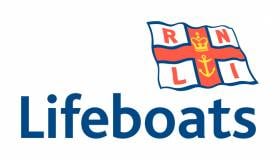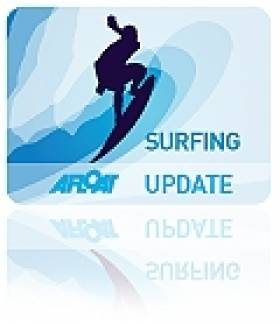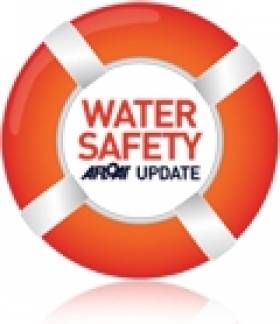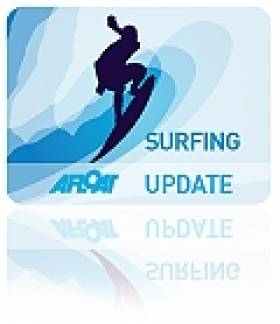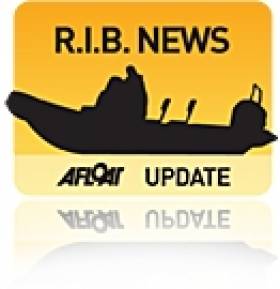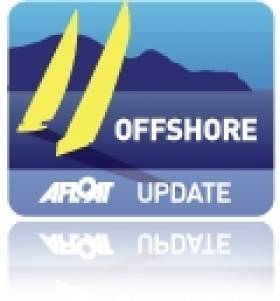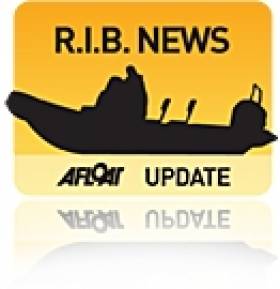Displaying items by tag: Cornwall
A humpback whale caught in fishing ropes off the coast of Cornwall in south-west England has been saved thanks to the efforts of local rescuers.
According to Marine Industry News, the whale known locally as “Ivy” became entangled in Mounts Bay on Easter Sunday (31 March) and was soon spotted in distress by both fishing crews and a wildlife-watching tour.
Conditions at sea were choppy at the time, meaning these onlookers could not intervene.
But in the afternoon Penlee RNLI’s volunteer lifeboat crew came to the rescue, cutting the whale free from their inshore lifeboat.
Hannah Wilson, co-owner of tour group Marine Discovery Penzance said: “It’s incredible what the guy at the helm achieved because it was properly rough.”
Marine Industry News has more on the story HERE.
Don’t believe everything you read, the RNLI advises, after the lifesaving charity was forced to debunk claims it was recently billed for an inflatable toy lost during the rescue of a child.
According to The Independent, there appear to have been some crossed wires after an RNLI event in Britain’s south west at the weekend at which an anecdote from the 1980s was recounted.
The alleged story of how the family of a girl rescued from the water off Porthleven in Cornwall sent an invoice for £7 for the girl’s missing lilo was reported as a recent incident by a number of news outlets.
The story came with a sting in the tale for the family in question, with the alleged response from the lifesavers being the suggestion of a bill of their own for the £7,000 cost of the rescue.
But the RNLI has since been moved to clarify that the incident took place more than three decades ago, if it ever took place at all.
The Independent has more on the story HERE.
New Surfing Exchange Project For Cornish & Irish Teens
#Surfing - A new surfing exchange programme for young people is promoting cultural relations between the UK and Ireland.
As the Cornish Guardian reports, up to 15 local teenagers will be selected to take part in the Wave Project exchange with Co Donegal, which has the aim of boosting confidence and reducing anxiety through surfing.
The first exchange takes place over next month's half-term holidays in the UK, when 13 Irish youth will stay in Newquay.
They will return the favour next spring over the Easter break when the Cornish teens will stay at a purpose-built facility on the Donegal coast.
The Cornish Guardian has more on the story HERE.
Don't Buy Boats When Drunk Says Harbourmaster
#BuyingABoat - Don't buy boats online when drunk - that's the strong message from a Cornwall harbourmaster who says he's spent thousands of pounds removing abandoned vessels from his port.
As the Cornish Guardian reports, Fowey harbourmaster Captain Paul Thomas pinned the blame on internet auction sites that make it all too easy for people to purchase a boat on a whim - without taking into account the costs of maintenance, mooring and insurance.
"It's one of the plagues of harbourmasters," he said of the impulse buying phenomenon.
"People can be seduced into buying a boat really easily, often late at night and maybe after a few drinks, but buying it is the easy part."
Among the vessels disposed of at Fowey in a recent crackdown on owners who've shirked their responsibilities include a catamaran, a yacht, numerous smaller vessels in various states of disrepair, and a fishing trawler of the likes that can cost tens of thousands of pounds to decommission.
The Cornish Guardian has much more on the story HERE.
Cornwall Surfing Tragedy Reminder Of Sea's Dangers
#Surfing - Winter surfers are reminded to beware of dangerous currents upon news of the tragic deaths of three people off Newquay at the weekend.
RTÉ News reports that the two men and one woman were part of a group of seven who got into difficulty while surfing at Mawgan Porth Beach in the popular Cornish surfing town.
Local surf school owner Peter Abell described conditions on the day as "not as bad as it can be" and "not particularly dangerous" but added that it "wasn't the safest of days to be in the sea".
According to the Guardian, safety measures at the busy surf spot are to be reviewed as it emerged the middle-aged surfers had entered the water at an area where the absence of beach lifeguards is clearly signposted.
#WaterSafety - The Guardian reports on a remarkable evening for lifeguards on Cornwall's Polzeath beach yesterday (Tuesday 12 August) when 32 people had to be rescued from am "incredibly strong" rip current.
The seven bathers and 25 bodyboarders had reportedly fallen from a sand bank "straight into the path of the rip current" at the northern end of the beach, according to senior lifeguard Ben Miskowicz.
It took just over an hour for the six-member RNLI lifeguard team to get all 32 men, women and children to safety, rating the conditions on the beach at high tide as "too dangerous".
The Guardian has more on the story HERE.
Now It's Wave Rage With Tirade Over Surf Rights in Cornwall
#surfing – 'F*** off back to England you ****!' A surfer who allegedly rode another surfers wave has been racially abused on a Cornish beach by a stand-up paddle boarder (SUP) who appears to consider Cornwall another country.
Longboarder Phil Brown, 29, was subjected to abuse after 'sharing' a wave. The former Army serviceman described it as 'disgusting' and 'inappropriate'.
The Unknown paddle boarder launched into a four-letter tirade at Bude, Cornwall. He told the surfer: 'I will put you in f*****g hospital' if he rode same wave again.
High-Speed Turn Led To Cornwall RIB Tragedy Says Official Report
#KillCord - An "exceptionally unusual" tight turn at high speed led to the death of a father and daughter and the serious injury of other family members in a tragic speedboat accident off Cornwall last year.
The Guardian reports on the conclusions of the official investigation into the incident on 5 May in which BSkyB executive Nick Milligan and his eight-year-old daughter Emily were struck and killed by the family's runaway RIB after being thrown overboard in the waters between Rock and Padstow.
It was previously found that the driver of the speedboat was not attached to the 'kill cord' that would have automatically shut off the engine. Instead, the boat continued to circle with its engine running, striking the family as they floated in the water.
Milligan's wife Victoria and four-year-old son Kit both sustained what were described by police as "life-changing injuries".
It has since emerged via the findings of the Maritime Accident Investigation Branch (MAIB) report that Victoria had been driving the boat in a slow wide turn when her husband reached across her to steer the boat hard to starboard at full speed.
The report added that "the manner in which Mr Milligan took the helm appears to have been out of character as he was known to be a safety conscious and prudent individual."
However, it was also found that the Milligans did not have a "good understanding" of how the speedboat would handle high-speed turns, nor were they aware of the hazards of their children being at the unstable front of the RIB.
The Guardian has much more on the story HERE.
Weather Troubled Irish Catamaran Arrives Safely In Cornwall
#Offshore - A catamaran sailing from Ireland to Cornwall has arrived safely at Newlyn harbour after a 22-hour journey troubled by poor weather.
As This Is Cornwall reports, the vessel was being monitored by Falmouth Coastguard after its original plans to dock at Falmouth were scuppered by inclement conditions at sea and a lack of fuel.
#KillCord - An official report into the tragic speedboat accident in Cornwall earlier this month that killed a father and daughter says that the driver was not attached to the boat's 'kill cord'.
As previously reported on Afloat.ie, BSkyB executive Nick Milligan and his eight-year-old daughter Emily were struck by the family's runaway RIB after being thrown overboard from the vessel on the afternoon of Sunday 5 May.
Four other family members were struck by the runaway boat as it circled in the water off Padstow. Nick's wife Victoria and four-year-old son Kit are recovering after sustaining "life-changing" leg injuries.
Police were reportedly investigating the role played in the incident by the boat's kill cord or safety lanyard, a device attached to the throttle that should automatically cut engine power if the driver is thrown from the vessel.
Now The Guardian reports the Marine Accident Investigation Branch's (MAIB) conclusion that the 8m Cobra RIB was fitted with a kill cord, but it was not attached to the driver.
It has not yet been determined who was driving the speedboat at the time of the accident, nor is it clear how the family was thrown from the vessel.
The report added: "The kill cord serves only one purpose, to stop the engine when the driver moves away from the controls.
"To ensure that this tragic accident is not repeated it is essential that all owners and operators of vessels ensure they are fitted with kill cords."


























